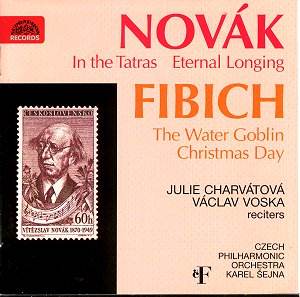
|
Vitezslav NOVAK(1870-1949) In the Tatras (1902 rev 1907) [16.43] Eternal Longing (1904) [20.52] Zdenek FIBICH (1850-1900) The Water Goblin - melodrama on words by Karel Jaromir Erben (1883) [16.35] Christmas Day - melodrama on words by Karel Jaromir Erben (1875) [13.20] Julie Charvatova (orator in Christmas Day) Czech PO/Karel Sejna rec Dvorak Hall, Rudolfinum, Prague, 14-15 Feb 1966 (Novak - stereo); Fibich items in mono: 15 June 1959 (Water Goblin); 15 Sept 1954 (Christmas Day). |
If you are curious about Novak's romantic orchestral impressionism (and you should be) it is now easy to find examples in the catalogues of Virgin and Chandos. Before that you had to rely on Supraphon. Long-time collectors will in the 'fifties have encountered his The Storm. In the 'sixties the two Sejna-conducted pieces here could be had on LP. I remember seeing copies in the W H Smiths sales of that time; not repertoire you see in Smiths now .... let alone in their sales.
Novak is a late romantic but not at all long-winded. Look at the playing times above. Novak was less a symphonist (though there is both and Autumn Symphony and a late May Symphony which I very much want to hear and seem destined never to find!) than a poet of scenery and emotions. In the Tatras refers to the Tatra mountains and the sublime feelings evoked by man amid dwarfing scenery. The storm that plays amid the mountains is an analogue for vulnerable creatures caught up amid destiny and the remorseless course of life. Novak excels at such things and wrote outside the box of nineteenth century compositional 'rules' taking on board pointillistic effects and clarifying rather than weighing down the textures. And my how superbly this music is orchestrated! Novak is broadly in the same territory as Delius's Song of the High Hills and Strauss's Alpensinfonie. He has his own hallmarks including what I can only describe as a singing restfulness - decorated with restraint - listen to the last five minutes. There is also his way with the solo violin - seeming to speak as and for man alone in the mountains. Novak learnt from Tchaikovsky but is less hysterical - more concentrated.
The Eternal Longing is founded on a tale by Hans Christian Andersen. The exhausted swan falls to the surface of the sea but, lifted by the irrepressible life force (the same force referred to by Nielsen in his Fourth Symphony), takes to the air once more. If you are already sympathetic to Alfvén's Legend of the Uttermost Skerries and to Hamilton Harty's masterly 1940s tone poem The Children of Lir you have to hear this. The rising to flight and regal horizons is gloriously coaxed and fanfared at 6.40. Another Swan (a Finnish one) glides into sight at 08.00 propelled along by the harp's decorous encouragement. While Sejna is outstanding In the Tatras either the invention pales or he loses impetus momentarily at circa 12.01 where I wonder if Novak really intended that the music should proceed so deliberately. Fibich remained faithful to the melodrama with earlier and less forbidding essays like these two preparing the ground for his 'operatic' Hippodamia trilogy (also available on Supraphon and reviewed elsewhere on this site). I say operatic because the subject is treated in that way but instead of being sung the roles are orated/acted by a large cast. It is like listening to a radio adaptation with a continuous musical score.Erben's The Water Goblin also attracted Dvorák. It was one of his late tone poems - all inspired by Erben tales. This one tells of the Water Goblin who lets his captive earth woman leave the lake on condition she leaves her child behind and returns at dusk. When her own mother prevents this the child is returned to the woman as a dismembered corpse left at the front door. Grisly but par for the course for many fairy tales otherwise softened and bowdlerised by publishers and film companies. Fibich is a very fine composer (as indeed is Novak). The music is Tchaikovskian with many dramatic strokes which touch off vivid coups. Voska acts his role cleverly and hushes and coarsens his voice combining role of storyteller and actor.
The Golden Spinning Wheel is another Erben legend set by Dvorak as a tone poem. Fibich's melodrama Christmas Day also features a spinning wheel but this time as a hypnotic focus for musing on the futures of two young maidens. The story unfolds and, put brutally, they fall for the same man who chooses one and the other kills herself. How much better it is not to know the future. The spinning wheel whirs onwards. Charvatova is every bit as honeyed and abrasive as Voska. Christmas Day ends more reflectively than the Water Goblin. Again the Fibich style is colourful, packed with pictorial references without being slavish or facile - a fusion of languages - this time principally Dvorák.
The music plays continuously and would work without the spoken part as a tone poem in its own right. The narration in both cases is in Czech but there are excellent parallel translations to English, German and French. Interesting that these two melodramas predate Dvorak's late tone poems.
Rob Barnett